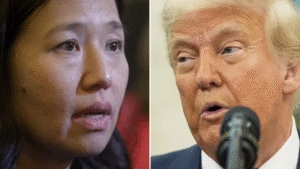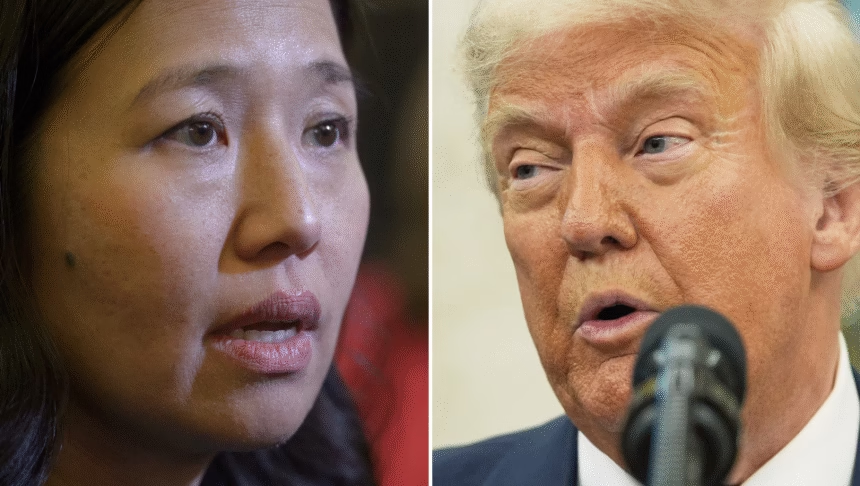President Donald Trump has threatened to relocate the 2026 World Cup matches scheduled for the Boston metropolitan area.
Asked about relocating Boston’s World Cup matches, Trump said, “We could take them away. I love the people of Boston and know the games are sold out. But your mayor is not good,” referencing city protests. “They’re taking over parts of Boston. We could get them back in about two seconds.”
The remarks, reported by Boston 25 News / WFXT and the Associated Press, come as Boston is scheduled to host seven matches during a tournament co-hosted by the United States, Mexico, and Canada. Gillette Stadium, located in Foxborough, serves as the venue, while Boston manages operations such as lodging, transportation, fan zones, broadcasting, and services. Mayor Michelle Wu’s office reaffirmed the city’s commitment: “Boston is honored and excited to host World Cup matches, and we look forward to welcoming fans from around the world to our beautiful city, the cradle of liberty and the ‘city of champions.'”
Trump insists that, if necessary, he would appeal directly to FIFA’s leadership. “If somebody is doing a bad job and if I feel there are unsafe conditions, I would call Gianni — the head of FIFA, who’s phenomenal — and I would say: ‘Let’s move into another location,’ and they would do that.” He continued about Gianni Infantino: “He wouldn’t love to do it, but he’d do it very easily.”
FIFA has clearly reaffirmed its exclusive authority over the World Cup. Earlier this month at a conference in London, Vice President Victor Montagliani stated, “It’s FIFA’s tournament, FIFA’s jurisdiction, FIFA makes those decisions.” The 11 U.S. host cities, along with those in Mexico and Canada, are contractually obligated to follow FIFA’s governance.
With eight months remaining before kickoff (June 11, 2026), any reconfiguration would require a substantial logistical and legal overhaul, including ticketing, security, transportation, hospitality, lodging, training schedules, broadcast operations, and private contracts.
The president’s comments follow recent National Guard deployments in several U.S. cities, including Washington and Memphis, amid court challenges elsewhere. In Boston, pro-Palestinian demonstrations led to arrests and injuries, reported alongside, but not operationally linked to, World Cup planning. Against this background, Trump mentioned areas being “taken over” without specifying which.
FIFA’s 2022 plan schedules 104 matches across the three co-host nations. In the United States, the tournament relies on major NFL stadiums (New York/NJ, Los Angeles, San Francisco Bay Area, etc.). New England offers Foxborough for venue capacity, while Boston generates economic spillover effects (tourism, commerce, culture, and universities). Local authorities coordinate preparations for security, mobility, and public health measures with state and federal agencies, according to Boston 25 News.
Extensive advance planning and contracts prevent such disruptions—hence FIFA’s reminder: ‘It’s FIFA’s tournament.’
The White House has escalated the debate to public safety, suggesting some cities could be deemed “unsafe” for hosting. Trump warned, “We could take them away,” while praising Boston fans but criticizing the mayor. The mayor’s office counters with a message of hospitality and pride: “Boston is honored and excited to host World Cup matches… the cradle of liberty and the ‘city of champions.'”
FIFA, for its part, maintains institutional neutrality, reiterating the governing body’s exclusive authority over venue selection and tournament governance while avoiding engagement in U.S. political disputes.
Beyond the symbolism, any relocation scenario would create significant uncertainty for hotels, restaurants, transportation providers, cultural venues, and event contractors that have invested in the June-July 2026 window.
Universities, numerous sponsors, and media outlets have already locked in their schedules. Any last-minute changes would shift costs and risks, potentially triggering disputes among contracting parties.

Sources: Boston 25 News







